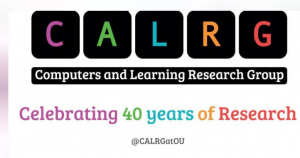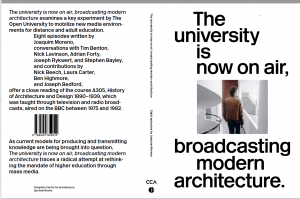Handbook of Open Universities Around the World Edited By Sanjaya Mishra, Santosh Panda
Thursday, July 17th, 2025Chapter 52 is about the OU.
https://www.routledge.com/Handbook-of-Open-Universities-Around-the-World/Mishra-Panda/p/book/9781032754055?srsltid=AfmBOorUVY68M4Qc5ca1jQxVDRkf9LexYYLsiMET-4hhrBBtZRh75MYA
Contents
Introduction
Sanjaya Mishra and Santosh Panda
SECTION I: General Overviews
1 Futures of Open Universities
Sir John Daniel
2 Open Universities: An Uncertain Future?
Alan Tait
3 Innovation for Survival: Are the “Four-Open” Principles Still Relevant to Open Universities in the Twenty-First Century?
Junhong Xiao
4 Tracing the Legacy of Open Universities: The Evolution of Openness and the Continuous Transformation of Open Universities
Aras Bozkurt, Frank Senyo Loglo, Berrin Cefa, Engin Kursun, John Y. H. Bai, and Olaf Zawacki-Richter
SECTION II: Open Universities in the Africa and Arab Countries
5 Africa Regional Overview
Paul Prinsloo
6 Botswana Open University
Mmabaledi Seeletso and Bantu L. Morolong
7 National Open University of Nigeria
Christine Ofulue
8 Open University of Kenya
Ezra Maritim and Elijah Omwenga
9 Open University of Mauritius
Kaviraj Sharma Sukon
10 The Open University of Tanzania
Elifas Tozo Bisanda
11 University of South Africa 105
Moeketsi Letseka, Ramashego Mphahlele, and
Morakinyo Akintolu
12 Zimbabwe Open University
Gift Masengwe, Paul Henry Gundani, and Benson Gabi
13 The Open University of Israel
Sarah Guri-Rosenblit and Amir Winer
SECTION III: Open Universities in the Americas
14 Open Universities in the Americas
Stephen Murgatroyd
15 Athabasca University
Kathryn R. Johnson and Matthew L. Prineas
16 Universidade Aberta do Brasil
Weslei Oki de Aguiar and Simone Guimarães Guerra Gama
17 Universidad Estatal a Distancia
Diana Hernández Montoya and Ana María Sandoval Poveda
18 Université TÉLUQ
Gustavo Adolfo Angulo Mendoza Patrick Plante, and Caroline Brassard
SECTION IV: Open Universities in the Asian Countries
19 Open Universities in Asia: An Overview
Insung Jung
20 Open Is Open as It Gets
Som Naidu
21 Asia e University
Dato’ Ansary Ahmed
22 Bangladesh Open University
Mizanoor Rahman
23 Dr. B. R. Ambedkar Open University
Ghanta Chakrapani
24 Guangdong Open University
Chen Jingchun, Luo Hongwei, Chen Liangjun, Niu Liuwei,
and Zhu Minghai
25 Hanoi Open University
Dang Hai Dang
26 Ho Chi Minh City Open University
Ha Minh Nguyen, Lan Thi Xuan Nguyen, and Quan Thai Thuong Le
27 Indira Gandhi National Open University
Santosh Panda and Ved Prakash Rupam
28 Jiangsu Open University
Wen Tang and Xiangyang Zhang
29 Korea National Open University
Eun Kyung Lee
30 Krishna Kanta Handiqui State Open University
Ritimoni Bordoloi and Prasenjit Das
31 Madhya Pradesh Bhoj (Open) University
Sanjay Tiwari and Gopal Krishna Burra
32 Nepal Open University
Jeevan Khanal
33 Netaji Subhas Open University
Anirban Ghosh and Papiya Upadhyay
34 Open University Malaysia
Nantha Kumar Subramaniam, Santhi Raghavan, and Ahmad Izanee Awang
35 The Open University of China
Wang Xiangxu
36 The Open University of Japan
Tsuneo Yamada and Masaya Iwanaga
37 The Open University of Sri Lanka
Shironica P. Karunanayaka
38 Shanghai Open University
Jun Xiao, Tingting Zhang, Juan Li, Xinkui Cheng, and Wei Chen
39 Sukhothai Thammathirat Open University
Sumalee Sungsri, Sarisak Soontornchai, Niranart Sansa, and Darunee Jumpatong
40 Tamil Nadu Open University
S. Balasubramanian and S. Savithri
41 Universitas Terbuka
Ojat Darojat and Fauzy Rahman Kosasih
42 University of the Philippines Open University
Melinda dela Peña Bandalaria
43 Uttarakhand Open University
Jeetendra Pande and Sumit Prasad
44 Uttar Pradesh Rajarshi Tandon Open University
Devesh Ranjan Tripathi and Ashutosh Gupta
45 Wawasan Open University
Josephine Ie Lyn Chan, Dewi Amat Sapuan, and Lily Chan
46 Yashwantrao Chavan Maharashtra Open University
Sanjeev A. Sonawane
SECTION V: Open Universities in the Europe
47 Open Universities: New Roles and New Opportunities for Innovation and Market Differentiation in Europe
Don Olcott, Jr.
48 Anadolu University
Aras Bozkurt
49 Fernuniversität in Hagen
Uwe Elsholz, Rahel Hutgens, and Desirée Kampmeier
50 Open University of Cyprus
Antonios Kafa
51 Open University of the Netherlands
Theo J. Bastiaens and Rob Martens
52 The Open University
Daniel Weinbren
53 Universidad Internacional de La Rioja (UNIR)
José María Vázquez García-Peñuela, Rafael Puyol Antolín, Rubén González-Crespo, Daniel Burgos, Teresa Santa María, Adela López, María Gómez-Espinosa, Ignacio Hierro, and Pablo Moreno-Ger
54 Universidad Nacional de Educación a Distancia (UNED)
Inés Gil-Jaurena, Ángeles Sánchez-Elvira Paniagua, and Miguel Santamaría Lancho
55 Universidade Aberta
Diogo Casanova and Isabel Huet
56 Universitat Oberta de Catalunya
Àngels Fitó-Bertrán and Albert Sangrà
SECTION VI: Concluding Overview
57 Open Universities: Quo Vadis?
Sanjaya Mishra and Santosh Panda


